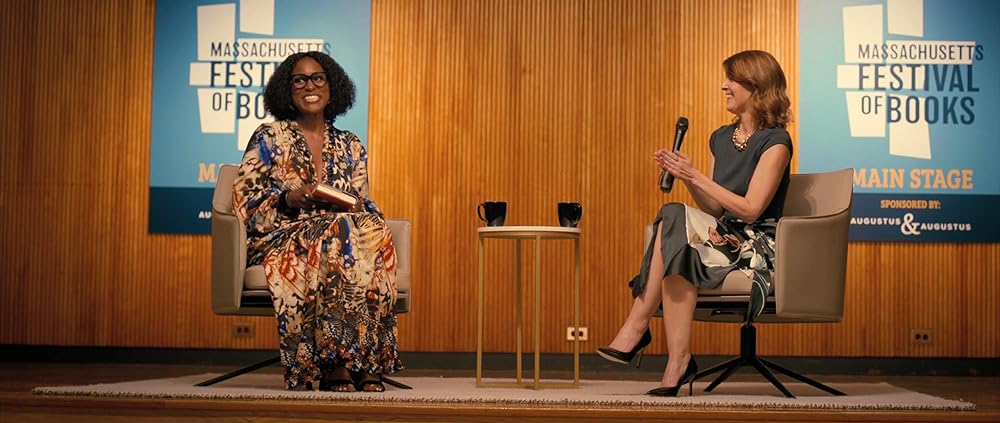Half of American Fiction is an engaging family drama, but the other half is a sometimes funny but often overdone satire of representation in entertainment.
A film that skewers white liberal interpretations of art created by Black individuals? Well, who better than I, a white person, to interpret this art created by a Black individual? Especially one who has basically no knowledge of what goes on in the literature industry? Based on the Percival Everett novel “Erasure” (which, big shock, I also haven’t read), American Fiction stars Jeffrey Wright as Thelonious “Monk” Ellison, a writer whose career has stagnated while other fellow Black writers have thrived for publishing work that’s more “Black.” When he and his family find themselves facing financial dilemmas, Monk publishes an intentionally terrible “Black” novel under a pseudonym to take a stand … only for that novel to become an instant hit, forcing him to commit further to the fake identity.
As the world at large continues to ask complicated questions about race and its role in society, one of the subjects that I’ve always been unclear on is what defines any piece of art as belonging to or representing a certain “race.” American Fiction dives into that issue, but it doesn’t spend as much time in the water as you may think. If anything, the debacle with Monk’s “fake” book is treated as the secondary plot of a more personal family-oriented story. For a while, you could cut out the pseudonym storyline entirely and not really have the main plot play out any differently. It’s only towards the end where the two storylines intersect in any substantial way.
While I was initially put off by this, American Fiction still holds your attention with the charisma of its cast and the conversations between them. Monk finds himself regularly at odds with his brother, who’s given so much laid-back life and sincerity by Sterling K. Brown. Monk and his sister (Tracee Ellis Ross) have an instantly believable rapport, although the direction that goes is one of the bigger surprises of the film. He finds a romantic interest in Coraline (Erika Alexander), leading to a relationship that’s cute but not one of the highlights of the film. The heart and soul of the family is undoubtedly Monk’s mother (Leslie Uggams), whose battle with dementia casts a dark cloud over an already slightly estranged group.
What makes all these relationships work are the performances and the slick, biting script that writer/director Cord Jefferson gives everyone in the family. All of the characters have distinct identities that are taken full advantage of as they all work off each other. In particular, Monk’s more refined, uptight demeanor clashes with his brother’s looser behavior, but the latter ends up having profound bits of wisdom that Monk’s been missing. They’re both very blunt, which brings out their best and worst traits as they communicate and reflect on each other’s history. In Monk’s case, he’s forced to think about how much he’s maybe put himself on a pedestal because of his writing career, at the cost of a better understanding of not just his family but people in general.

When that conflict finally leaks into his antics under his pseudonym, it creates a solid internal debate when it comes to what he should do next, or if he should just burn the whole ploy down. Like I said, I know very little about the industry of literature, but I am familiar with the more general trend of historically abused or troubled groups being disproportionately defined just by that terrible history. In this case, Black people seem to have more stories about struggles against slavery, prejudice, or rough times than anything else. Monk, a Black writer who’s chosen to not tell those types of stories, is convinced that this is why his books aren’t selling, a notion that’s basically confirmed when the book he deliberately writes to enforce those stereotypes takes off so quickly.
I’m 100% certain that this is an actual big problem, with books and all other art mediums. I’m sure there are countless white people out there who want to keep seeing the Black experience defined in that harsher way, which only serves to reenforce the mold that many people like Monk want to be free of. They’re white liberals who want to feel absolved, or those who want to be reminded how much better off their own race has been, or even just general audiences who don’t want to think beyond what they already know. American Fiction takes all of those people and absolutely rips them a new one, tearing down the defenses of everyone who lets this system be upheld … and, from my own perspective that’s one of many, it gets a little too carried away.
It’s not just that every white reader, critic, and corporate person so instantly buys into Monk’s book; it’s the degree to which they do it and how many extreme things they embrace because of that. Monk’s pseudonym is a current wanted fugitive, but no one ever cares. Some people in the industry actually meet with him in person and totally buy the intentional stereotype he is. The title of his book starts out already sounding like an obvious satire, but it’s then changed to something so dumb that I have a very hard time believing that even the fake-as-hell wannabe white “allies” would keep up their acts. Monk tries to suicide bomb the project multiple times in extreme ways that I’d think should instantly work, but because white idiots are white idiots, it doesn’t.
I could buy all of this behavior if the entirety of American Fiction maintained this satirical tone. But the story of Monk and his family, a huge bulk of the film, doesn’t. Not only is it far more grounded in both the situations and characterizations, but it contains some of the most poignant film lines I’ve heard in a while. They cut so directly and deeply, giving you so much to think regarding how we let ourselves be seen and the contrast between integrity and vulnerability. I feel like I’m watching people here … but that doesn’t mix well with the much more exaggerated and unambiguously stupid portrayals of almost everyone involved with the plot involving the book.
Yes, there are tons of ignorant people working in entertainment, and many of them can and have done drastic, debilitating damage because of the power they hold. But I don’t think they’ll just go with everything, or be so unanimously on board with the stunts Monk pulls. In trying to skewer what a lot of them have gotten away with in the business while also telling a more believable story, American Fiction pushed my suspension of disbelief too far. I stopped seeing real people and started seeing the mouthpieces of the film’s messaging. I stopped being angry at certain characters because it felt like the film was making it way too easy to be angry at them. I didn’t feel like my beliefs were being challenged; I felt like someone was wagging their finger at me.
But I need to reemphasize again: I don’t know the book industry or what the people within it are like. I’m speaking as someone who isn’t knowledgeable enough to tell you how realistic American Fiction is on that front. Maybe it’s spot-on for all I know. But for it to feel this fake still left me with a major disconnect that undercut the many questions I would have loved to be forced to think more deeply about. How possible is it for an artist of color to do their community a disservice? Where’s the line between trying to represent a group and trying to be an individual? How can we tell which representation is authentic and which is reenforcing notions some people don’t want reenforced? Does it matter how many in the community feel that way? What does it say if everyone feels differently?

These questions are all in American Fiction, and the film thrives when they’re discussed with any form of nuance. But that doesn’t happen enough for me to feel like I’ve taken much away from the film intellectually. But as I alluded to at the start of this review, I’m not a person of color. I don’t have the perspective or experiences that Cord Jefferson, his characters, and probably tons of other people watching the film have had. And like always, I’m not at all saying that I’m right while everyone else is wrong. I’m just bringing my own thoughts in and sharing what my response to the film is.
For my own money, half of American Fiction is an engaging family drama, and the other half is a sometimes funny but often overdone satire of an industry still filled with problems. I guess it’s fitting that in a film about how the “Black experience” is exploited, the aspects that I like most are the ones that don’t discuss that exploitation. But I know plenty of people are going to react very differently and probably have a huge wave of catharsis wash over them as they see their passions and frustrations represented on the screen. The great performances, genuinely emotional moments, and some of the razor-sharp writing did work for me exactly as intended. I just couldn’t embrace the entirety of what American Fiction is trying to do.
American Fiction premiered at TIFF on September 13, 2023 and will be released in select US theaters on December 15 and nationwide from December 22.

